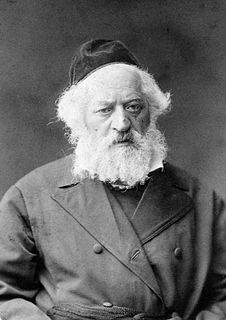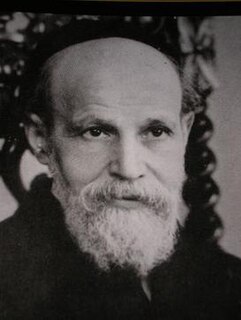
A kollel or colel is an institute for full-time, advanced study of the Talmud and rabbinic literature. Like a yeshiva, a kollel features shiurim (lectures) and learning sedarim (sessions); unlike a yeshiva, the student body of a kollel consists mostly of married men. A kollel generally pays a regular monthly stipend to its members.

The Musar movement is a Jewish ethical, educational and cultural movement that developed in 19th century Lithuania, particularly among Orthodox Lithuanian Jews. The Hebrew term Musar, is from the Book of Proverbs (1:2) describing moral conduct, instruction or discipline, educating oneself on how one should act in an appropriate manner. The term was used by the Musar movement to expand the teachings further regarding ethical and spiritual paths. The Musar movement made significant contributions to Musar literature and Jewish ethics. The movement has been revived in the 21st century amongst Jews of all denominations, particularly in the United States.

Hebron Yeshiva, also known as Yeshivas Hevron, or Knesses Yisroel, is a yeshiva devoted to high-level study of the Talmud. It originated in 1924 when the roshei yeshiva and 150 students of the Slabodka Yeshiva, known colloquially as the "mother of yeshivas", relocated to Hebron.
Yisrael ben Ze'ev Wolf Lipkin, also known as "Israel Salanter" or "Yisroel Salanter", was the father of the Musar movement in Orthodox Judaism and a famed Rosh yeshiva and Talmudist. The epithet Salanter was added to his name since most of his schooling took place in Salant, where he came under the influence of Rabbi Yosef Zundel of Salant. He was the father of mathematician Yom Tov Lipman Lipkin.

Ner Israel Rabbinical College, also known as NIRC and Ner Yisroel, is a Haredi yeshiva in Pikesville, Maryland. It was founded in 1933 by Rabbi Yaakov Yitzchok Ruderman, a disciple of Rabbi Nosson Tzvi Finkel, dean of the Slabodka yeshiva in Lithuania. It is currently headed by Rabbi Aharon Feldman, a disciple of Rabbi Ruderman and a member of the Moetzes Gedolei HaTorah of America.

Yitzchak Elchanan Spektor or Isaac Elhanan Spector was a Russian rabbi, posek and Talmudic sage of the 19th century.

Telshe Yeshiva is a yeshiva in Wickliffe, Ohio, formerly located in Telšiai, Lithuania. It is a prominent Haredi institution of Torah study, with additional branches in Chicago and New York.
A mashgiach ruchani – or mashgiach for short – is a spiritual supervisor or guide. He is usually a rabbi who has an official position within a yeshiva and is responsible for the non-academic areas of yeshiva students' lives.

Yechezkel Sarna (1890–1969) was a disciple of Nosson Tzvi Finkel,, spiritual mentor of the Slabodka yeshiva. He was sent by Finkel to move the yeshiva from Europe to Hebron in 1925, and following the 1929 Hebron massacre, to Jerusalem. In 1934, he assumed the position of rosh yeshiva. Over the years, he produced thousands of students, many of whom became prominent roshei yeshiva and rabbis in Israel and abroad.
Yaakov Yitzchok Ruderman was a prominent Talmudic scholar and rabbi who founded and served as rosh yeshiva of Yeshivas Ner Yisroel in Baltimore.

Eliezer Gordon also known as Reb Laizer Telzer, served as the rabbi and rosh yeshiva of Telz, Lithuania.
Chaim Shalom Tuvia Rabinowitz, also known as Reb Chaim Telzer, was an Orthodox Lithuanian rabbi and rosh yeshiva of the Telshe yeshiva. He developed a unique method of Talmudic analysis which became renowned throughout the yeshiva world as the Telzer Derech.
The Novardok Yeshiva in Navahrudak, then the Russian Empire, was one of the biggest and most important yeshivas in pre-World War II Europe, and a powerful force within the Mussar movement. It was the first of hundreds of a network of Musar yeshivas, which were created subsequently. They all assumed the name of Novardok yeshivas.

Naftoli Trop was a renowned Talmudist and Talmid Chacham. He served as rosh yeshiva of Yeshiva Chofetz Chaim in Radun, Poland.
Yosef Yozel Horowitz, also Yosef Yoizel Hurwitz, known as the Alter of Novardok (1847–1919), was a student of Rabbi Yisroel Salanter, the founder of the Musar movement. Horowitz was also a student of Rabbis Yitzchak Blazer and Simcha Zissel Ziv and spent some time in Brest, learning from Rabbi Chaim Soloveichik. He established the Novardok yeshiva in the city of Navahrudak. Additionally, he established a network of yeshivas in Dvinsk, Minsk, Warsaw, Berdichev, Lida and Zetl. Some of his discourses were recorded in the book Madregas Ha-Adam. The most basic and important theme in his book is Bitachon.

Rabbi Tzvi Hirsch Ferber was a renowned Talmudic and Torah scholar, gifted orator, prolific author and tireless community builder. A man of outstanding knowledge and talent, he was an exemplar of old-world Lithuanian Torah scholarship and sagacity.

Yitzchak Blazer (1837–1907) was an early important leader of the Musar movement.

Yeshivas Knesses Yisrael was a yeshiva located in the Lithuanian town of Slabodka (Vilijampolė), adjacent to Kovno (Kaunas). It was known colloquially as the "mother of yeshivas" and was devoted to high-level study of the Talmud. It functioned from the late 19th century until World War II.

Yeshivas Knesses Beis Yitzchak was an Orthodox Jewish yeshiva, founded in Slabodka on the outskirts of Kaunas, Lithuania, in 1897. The yeshiva later moved to Kamyenyets, then part of Poland, and currently in Belarus, and is therefore often referred to as the Kaminetz Yeshiva or simply Kaminetz. The yeshiva was famously led by Rabbi Boruch Ber Leibowitz.

Rabbi Yitzchak Isaac Sher was the rosh yeshiva of the Slabodka Yeshiva in Lithuania and Bnei Brak. He was the son-in-law of Rabbi Nosson Tzvi Finkel, the Alter of Slabodka.














